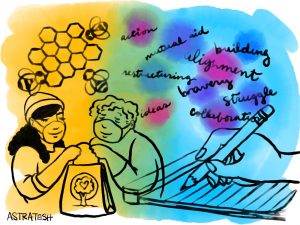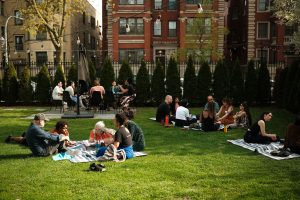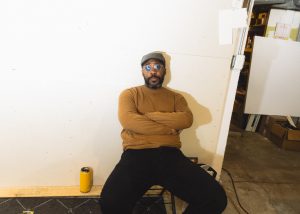“Beyond the Page” digs into the process and practice of writers and artists who work at the intersection of literary arts and other fields. For this installment, I interviewed Jasmine Davila and Rosamund Lannin, co-producers and co-hosts of Miss Spoken — a live storytelling show and podcast featuring work by the female-identified, exploring a new theme each month. I spoke with Jasmine and Rosamund in late April about the show’s origins (and amazing themes), their own influences, and why creating spaces for women’s experiences is so important.
Check out Miss Spoken at the Gallery Cabaret, the last Wednesday of every month at 7pm. Find @MissSpokenChicago on Facebook and @MissSpokenChi on Twitter. This interview has been edited for length and clarity.
Marya Spont-Lemus: To begin, what is Miss Spoken and how did it come to be?
Rosamund Lannin: Miss Spoken is lady live lit. It’s personal essays by the female-identified, which means cis-women, trans-women — anyone who identifies as a woman is eligible to participate. We have also had gender non-conforming people participate as well. “Lady live lit” is catchier than “genders less represented in the artistic canon live lit.” And it is a live lit show, one of many live lit shows in Chicago right now.
Jasmine Davila: Miss Spoken came to be in 2014. I remember this, because–
RL: She was there.
JD: I was there, but I didn’t start it. Rosamund co-founded it with Carly Oishi, who from 2012-2014 co-produced a different live lit show called Solo in the 2nd City, which focused on people’s personal stories about dating in Chicago. Carly and her co-producer decided to end that show in 2014, and Carly started working on launching this. Meanwhile, Rosamund mentioned to me that she was interested in starting a “lady” live lit show. And I thought, “Ohh! Well, you two should talk to each other.” So we went to Garcia’s and we ate Mexican food and that’s how Miss Spoken was born. Or at least that’s how I figure it — it’s like, I went to the meal and, a few months later, Miss Spoken was born.
RL: I don’t think I knew Carly before that. But I’d known Jasmine for a few years through various friend groups. Probably through Gapers Block, originally?
JD: I think so.
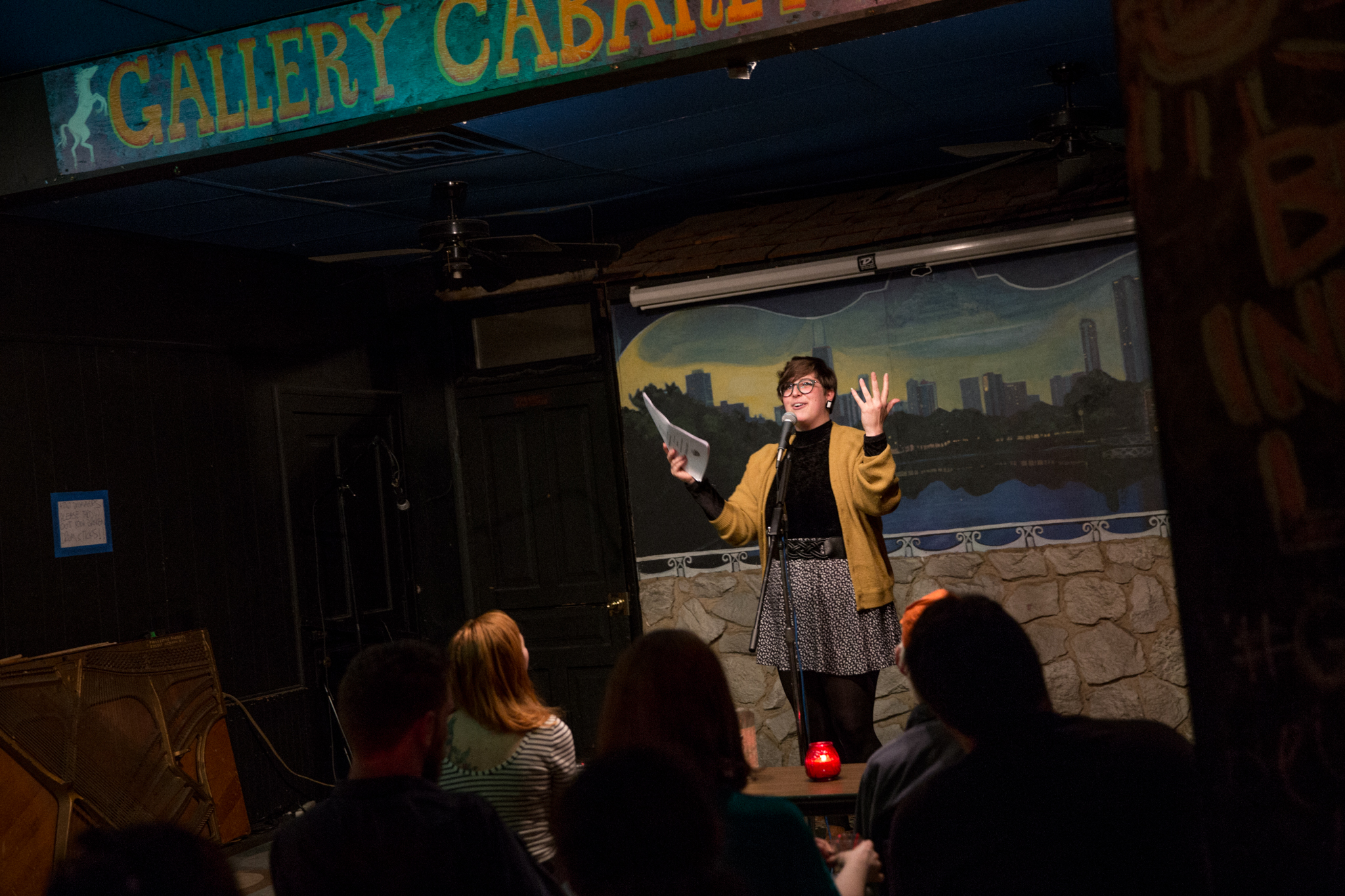
RL: I’d started to read at live lit shows, but I’d never hosted one of my own. I liked the idea of having one that was mine and someone else’s — like having a show. I like themes. [laughs] And there weren’t that many all-lady live lit shows in the city.
JD: Not at the time, no.
RL: There was the kates, which is a comedy show, and they’re fantastic.
JD: And there was That’s All She Wrote, with Angela Benander and JH Palmer, which I think ended in 2017.
RL: There might have been more — I’m sorry if I’m forgetting you! But there weren’t that many all-lady live lit shows, and it seemed like a new thing to do.
And I guess, growing up — for a lot of us, unless you were born very recently — women’s voices were not elevated a lot, and a lot of things that women talk about and women’s perspectives were considered frivolous or ridiculous or just not that important.
MSL: Taboo also.
RL: Or taboo! That’s a good point too. All right, let’s get in there! [Marya laughs] “Period blood is gross.” “Talking about makeup is stupid.” And the commonality is that it’s stupid or gross because it’s feminine or related to women. So that was enough of a reason where I felt like women should have this kind of space. Not with the idea of being exclusive, but with the idea of, “This is something that is specific to us.”
JD: Right. And not just as writers and performers but as audience members as well. Because I think that some people still think of bars as being, like, inherently masculine or male. I think that’s an idea that is changing or needs to be changing. The Gallery Cabaret, which is where Miss Spoken has always been, has been a great venue.
RL: And people often use words like “safe” and “supportive” to describe the show, I think both in terms of audience and of performers. We’re very open and welcoming.

Podcast: “Boobs” episode of Miss Spoken, hosted by Rosamund Lannin and Carly Oishi and featuring Samantha Irby, Alicia Swiz, Jasmine Davila, Natasha Samreny, and Melanie LaForce. Image: The Miss Spoken logo is a drawing of an open mouth, with the words “Miss Spoken” stretching across the inside in all caps. The lips are hot pink and the words are gold on black. Logo created by Monica Martinez. Image courtesy of Miss Spoken.
MSL: When you started Miss Spoken, was there a certain set of people that you had seen perform locally that you were thinking would be great for Miss Spoken? Was it like “I know all these great people and want to give them more of a platform” or “if we build it, they will come” or something else?
RL: I don’t know if the people that Carly and I originally had in mind needed more of a platform.
JD: Yeah, because we had Samantha Irby–
MSL: I saw that you had her on the first episode of your show!
RL: She seems like she’s doing fine. [laughs] She’s doing well for herself.
JD: Even in 2014 when we started, she was already well on her way. She had published her first book by then. I think the live lit show that she used to co-host with Keith Ecker, Guts and Glory, was still going on. People were totally aware of her. So she was a big draw.
RL: There were also other people that we had in mind, who we’d seen and loved in the live lit scene and wanted to have be a part of it. Like Karen Shimmin, co-host of Essay Fiesta. I don’t think that I ever had an “if you build it, they will come” attitude — mainly because I knew we’d reach out — though eventually other people did start to come. These days, we get a fair amount of submissions, which is great.
MSL: Something I noticed at Miss Spoken and really appreciated is that you allow people to read or bring notes up — like they don’t have to memorize their piece.
RL: Oh, god.
MSL: And I know some live lit events don’t allow that. It always struck me as rather prohibitive, whereas allowing people to bring material to read or reference, if they want, feels more inclusive to me. Like, yes, some people are professional performers or oral storytellers or just very comfortable talking in front of a group, and other people just have a great story and unique experiences they can share.
JD: Oh, yeah! Exactly.
RL: Yeah, I think that we always meant to have a mix of emerging and more well-known readers. I don’t want it to ever feel like, “I have to have done live lit for five years.”
JD: Right, or “I have to know this story so well that I know where to stop for applause.”
RL: Or “I have to be a ‘master performer.’” No. It’s not to say we don’t have master performers. Like Lily Be is amazing. But I think it’s good to have a mix. And there’s so many things in life that have a bar to entry, especially in the creative world, that I don’t want people to be terrified or to feel like, “Oh god, I better have my beats down pat.” Though if you do, it’s great! And also, I’m never going to memorize my own stuff.
JD: Oh, fuck no. I’m never going to do that.
RL: I’m literally not going to. And I wouldn’t ask anyone to do anything that I wouldn’t do. That feels wrong. [laughs]
MSL: Together, do you two think of yourselves as co-curators? Co-producers?
RL: Co-producers. And I’d say it’s a solid “co-.” We have a division of labor but it’s fifty-fifty.
MSL: And Jasmine, you stepped in as co-producer with Rosamund when Carly stepped away? When was that, roughly?
JD: My first show as co-host/co-producer was November 2016.
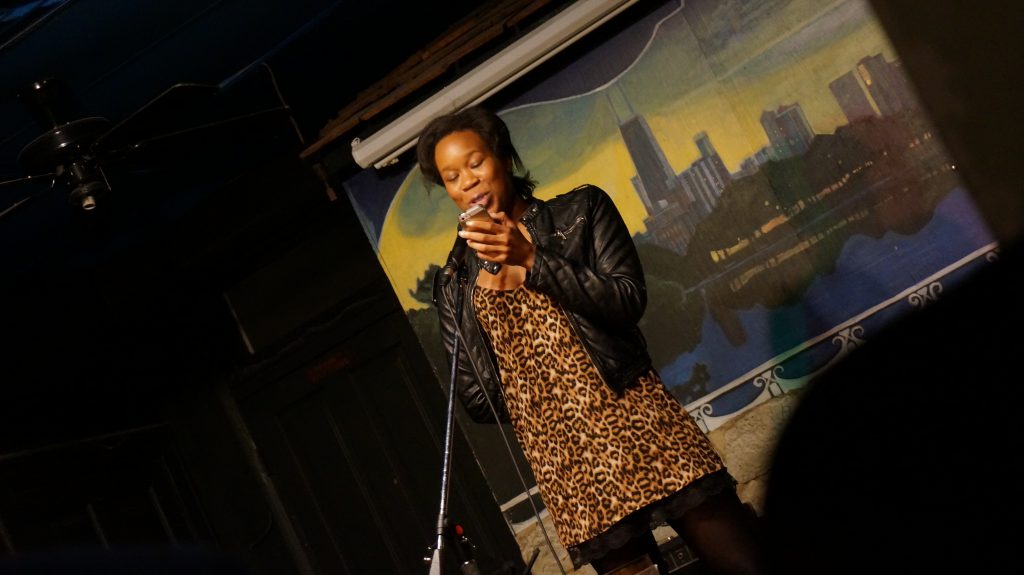
MSL: How did each of you come to this kind of “live lit” storytelling? It wasn’t something I was aware of before moving to Chicago.
RL: Oh, really? I’ve lived in Chicago for 10,000 years, as has Jasmine, so I don’t know what other places do anymore. No, I’m kidding, but that’s a good point.
JD: I wasn’t aware of it until 2011 or 2012. I’ve known Carly for almost 20 years, and she got me into it. She asked me to read at the first Solo in the 2nd City. And even after I started, I never pitched myself to other shows. I didn’t go to other shows. I always felt like I was just doing Carly a favor. Like, if someone dropped out or if she thought a story of mine would be a good fit. That show didn’t have monthly themes because it had sort of an overarching theme. But I would always go to Solo in the 2nd City, so I got to know a lot of the people who read for them, and a lot of the people who attended who were regulars. It was at Beauty Bar and it was just a fun atmosphere, that also felt very welcoming and inclusive of women and non-binary folks. So I’ve been doing live lit ever since. I don’t generally pitch to read at other shows, though — not because I’m so obnoxious and picky, it’s just that I don’t have the time! [laughs] I mean, I guess if I ever bothered to go to other people’s shows, I’d be like, “Oh, I should totally just send them an email–”
RL: Like, “Hey, if you ever need a reader–” Do we do this? No. [laughs]
JD: No. Also because I know that I’m doing Miss Spoken and this is my priority.
RL: As for me, I have an English degree, and– Do you have an English degree, Jasmine?
JD: No, mine is General Studies in the Humanities–
RL: Oh my god. Stop.
JD: –which is the vaguest department name ever.
RL: I also like that I didn’t know your major until now. [all laugh]
JD: I don’t even know what the fuck it is anymore. But that’s what I did. It was in the ’90s at the University of Chicago, and at the time they didn’t have an academic film or theater department. I also picked General Studies in the Humanities because the advisor was this really goofy guy who was always chugging Diet Pepsi in his office and was really fun to talk to. And I could tell him like total bullshit about what I wanted and he would be like, “Yeah, that sounds like a great idea! Take a Diet Pepsi on your way out.”
RL: Oh my god. This feels like SAIC. My husband Sean also has only a vague recollection of what he graduated college with. He’s like, “I don’t know, screen-printing?” Long pause. “Maybe. Something.”
JD: Exactly.
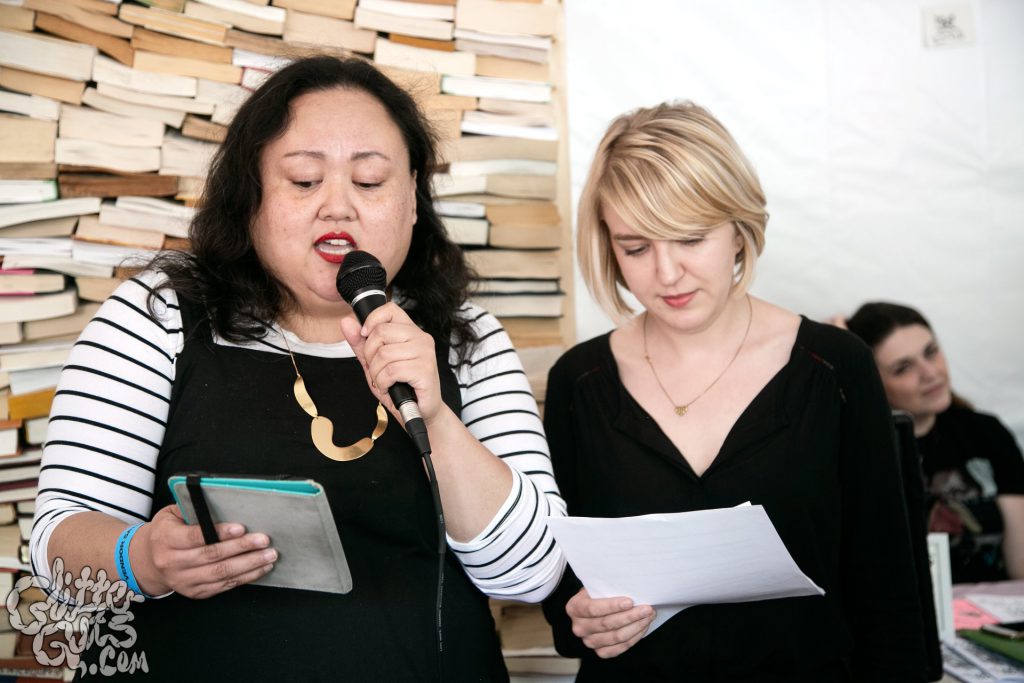
RL: But anyway. I have an English degree from Loyola with a focus on creative writing, and at some point in my 20s I was like, “I should probably try to use this.” Then did nothing for five more years. [laughs] But then I think I saw an event on Facebook or something and decided to try live lit. I remember the first live lit event that I performed at: Two Cookie Minimum, at the Hungry Brain. But I knew the guy involved and figured, “Eh, might as well give this a shot.” And afterwards I thought, “That actually went pretty okay!” I liked it because it seemed more — I don’t know — flexible and fun than literary journals or stuff like that. Performing was scary to me, but it was way less scary than trying to, like, break into this real or imagined bastion of “writing,” quote-unquote. I was like, “Oh, I can go up on stage! I’m funny.” [Jasmine and Marya laugh] Sorry.
JD: “I’m not terribly boring.” [laughs]
RL: It’s so real though! [laughs] “I can throw my voice.” But it seemed like a much lower barrier to entry because I’d see a wide variety of people doing it. It wasn’t just some dude who published a novel or five novels or whatever. It was performers, and people that were more in my realm. So I did Two Cookie Minimum — I think that was 2011, 2010 — and a couple other shows, like Essay Fiesta. Then, eventually, I thought, “It would be great to have my own series!” So that’s kind of how I got into it.
MSL: Was there anything in your program that you remember being–?
RL: You’re asking if I remember something from college. Just keep going. We’ll see how this goes.
MSL: Well, maybe I don’t have to ask it that way, but I guess I’m wondering–
RL: No, go for it.
MSL: –if you had any training or experiences through your creative writing program, or through something else, that were geared toward this kind of live storytelling. Because I think some people get to it through stand-up–
RL: Sure. That’s a good point.
MSL: –and I feel like with a lot of the Miss Spoken I’ve listened to, I think, “Oh, this is like stand-up — but I don’t usually like stand-up….” [laughs] Like, “This is stand-up that I want to go to!”
RL: That’s the greatest review of our show I’ve ever heard. [all laugh]

Podcast: “Confessions” episode of Miss Spoken, hosted by Jasmine Davila and Rosamund Lannin and featuring Keisa Reynolds, Meagan Dahl, and Megan Henricks. Image: Miss Spoken logo.
JD: We have had more comedians come to our show over the years. They’re in Chicago because they’re going to Second City or iO, doing improv or sketch comedy. I think they come to us because it’s another opportunity to get up on stage or they like our themes. So they pitch us and we’re like, “Well, they sound like they could be hilarious, so why not?”
But then they discover that, even if they come up and do sort of traditional stand-up that it feels different. Because the audience is different. And because they see other folks come up and actually read. I’ve had a couple of them come up to me after and say that the experience felt a little deeper. Because it is so personal. And, you know, though people are usually funny when they read for us, they don’t have to be.
RL: Right. Which I think is a common misconception. I mean, I love it when people are funny. But also it’s good to have a mix, and I don’t think they can’t all be on the same stage.
Your point is interesting because I think — again, speaking of traditionally masculine spaces — stand-up comedy feels bro-y as shit a lot of the time.
JD: It’s very competitive. You have to “kill.” And you don’t just have to kill the audience, you have to basically decimate the other guys who went before and after you.
RL: Right. And ours is more like a group hug. [Marya laughs]
JD: Where it’s like, we have this theme and I want to hear what you think about it. We read these pitches and some of them are just so incredible! In so few words, we’re thinking, “We need to hear this story, and we can’t wait to hear this story, and we know that everyone in the audience and the other readers can’t wait to hear it either.”
RL: Yeah. There’s a lot more empathy and warmth. And that’s not to say there aren’t brutal takedowns in it as well.
JD: Like the pizza show.
RL: That’s what I was thinking of, too. It got rough! I like that our meanest show was about pizza.
JD: Yeah. I just talked shit about everybody else in the show. [laughs]
RL: It was so good. But anyway, it’s not to say that we don’t want snark and mean. Because that’s funny and that’s interesting.
MSL: And rage is real.
JD: Yeah.
RL: Oh, yeah. I love a good angry story.
Kelsie Huff, who runs the kates, told me a great thing once about competition. Basically, Chicago’s not as competitive as other places, because there’s no money for anything art-related anyways. So you might as well not shit on everybody else, because none of us are going to “make it” here, quote-unquote, in the same way that you might in New York or LA. It’s different. It is different.
Getting back to your original point, I hadn’t really done any stand-up comedy, because I was too scared–
JD: You took that class.
RL: I did take that class. I took Feminine Comique — “Fem Com” — which is a stand-up lady comedy class. So I guess this all was kind of coalescing.
MSL: A friend of mine did Fem Com!
RL: Oh, awesome! It was great. I loved it. I do not want to be a stand-up comedian, but I think it’s really helpful to get you out of your own head and give you a sense of timing, and also just a new respect for people who do do stand-up comedy. But, again, Fem Com is an all-women class, and that made it very different. I think that a lot of the reason I didn’t approach any of this stuff earlier is that I had the usual insecurities of, “Oh, I’m not good enough,” “I’m not aggressive enough” — and then you get out in this world and you realize it’s different than what you thought.
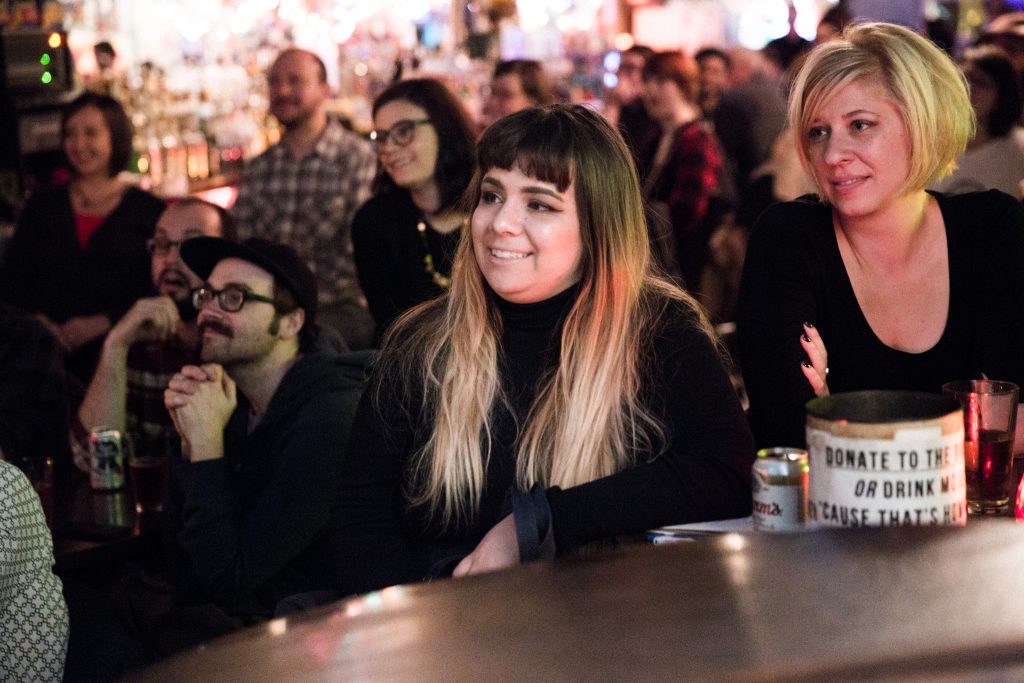
MSL: What does the process of creating a show or a season of Miss Spoken look like for you? How far in advance are you coming up with the themes and issuing the calls? How does it all come together?
RL: Basically, by the first week in January, we want to have all the themes for the year set up. So for this year, we met either in late 2018 or early 2019.
JD: And we don’t do a December show.
RL: We winter for December.
JD: Like the wealthy.
RL: In Chicago. [all laugh] It’s the saddest use of the word “winter.”
JD: Like the Rockefellers that we are. [all laugh]
RL: Like the Rockefellers that we are, we winter in frozen climates. [all laugh] Sometimes Jasmine goes to New York, which is also cold.
Usually late the year before, we solidify the themes, and then we have a roughly three-month call period for people to submit for that year. We have a Google Form that people can fill out and use to indicate which themes they might be interested in. Sometimes, if there’s someone that we really have in mind, we’ll seek them out individually. So it’s a mix.
We figure out the readers for January and February right away because we still have to have the show, and we aim to finalize the rest for the year by March. And sometimes people drop out because things happen and then we might call in a favor with a past reader, or we’re just like, “Augh, let’s add a sixth person!” It shakes out roughly and things adjust throughout the year.
MSL: Where do the themes come from?
RL: The darkest recesses. [Marya laughs] Don’t we usually brainstorm them separately, and then come together and fight it out?
JD: Yeah, we also have a Google Doc where we keep track of all the themes we’ve come up with over the last couple of years, which we just add to as we think of things. Then, late in the year, we’ll sit together and look at it.
RL: I think we’ve felt more comfortable getting weirder with the themes in the last year. In terms of the strategy behind it, I think you want to do a blend of crowd-pleasers — things that people will be like, “Hell, yeah!” about — and maybe going a little weirder or less popular.
JD: Like “Ohio.” Which is weird, but it’s not less popular! I think I came up with that theme two years ago and then we almost added it last year but thought, “No, that’s a little too weird.” And then we added it for 2019 and–
RL: People went buck wild.
JD: “Ohhhhh! I’m so excited for ‘Ohio’!”

Podcast: “Suffragette City” episode of Miss Spoken, hosted by Jasmine Davila and special guest co-host Ines Bellina and featuring Chloe Riley, Samantha Abernethy, Hope Rehak, and Leah Jones. Image: Miss Spoken logo.
RL: But having a mix is important. You still want to have things that people will show up for. I think we try not to get too niche. Because then it’s hard to think of what you want to do for that. We already get, “Oh, I don’t know if this fits….” You don’t want to give people too many parameters, but you also don’t want to make it so broad.
JD: Or it’s a little too loose, where you give “Petty” and you get people who are like, “Let me tell you how much I love Tom Petty,” And I’m like, “That’s not what we’re–”
RL: For the record, I was cool with that. [all laugh]
JD: You’re always cooler with more stuff! But I’m like, “No! That’s not what I wanted to hear.”
RL: That’s accurate. I’m like, “Yeah!” and Jasmine’s like, “Hmmm….” But you don’t want to do a theme as broad as, say, “Love.”
JD: Oh, god…. No.
RL: That’s so broad. You have to find that middle ground. And also, to be blunt, our themes should be things that we want to hear women’s perspectives on, or that are more female-specific. Like we had “War Paint,” which was about makeup. Or “Sleepovers,” which was one of my favorites. Because afterwards, some guy in the audience was like, thousand-yard-staring, “I didn’t know…sleepovers…were like this….” [Marya laughs]
JD: Aww…
RL: So sometimes themes are pretty specific to a female experience or particular to being a woman — like “Boobs” or, apparently, “Sleepovers.”
JD: “Swimsuit Season.”
RL: But also we have themes that aren’t, that we just would like to hear women’s takes on or hear about through that lens. This year we’ll also have “Worth,” “Ghost,” “Keeping the Faith.” So that’s some of what we have in mind with the themes. And also, just what people will like. I like people to show up to the show. “How this will play with a crowd?”
JD: We’ve done a “Fangirl” or “Freaks and Geeks” type show three times in the last…two years? It’s really popular.
RL: We’ve done a couple of shows with a visual component. “Show and Tell” was really great.
JD: We’ve also been asked to do some extra shows, like Lit Crawl. Last year we did Pitchfork.
RL: With Book Fort. That was really fun.
Video: “Sarah Becan at Miss Spoken”: The video thumbnail shows a detailed and colorful illustration, titled “a Saturday donburi!” The illustration is on a tan background and includes small drawings of ingredients and cookware, each labeled in script and connected to each other by plus signs or arrows to indicate the process of preparing the dish. The video frame beyond that is white, and a pink, black, and white “Miss Spoken” logo is displayed in the top left-hand corner. Video courtesy of Miss Spoken.
MSL: “Debt” was your second episode, right? I think what you’re talking about in terms of balancing the themes is exemplified even in those first two episodes. Like, leading off with “Boobs” as your inaugural show, which is specific to a certain range of experiences, and then having “Debt,” which is in some ways a universal experience but it’s like, “We’re interested in this specific lens on that experience,” while keeping it pretty open in other ways.
JD: It’s not just about money, or not having money, or owing money–
RL: Or owing something.
MSL: Or having something owed.
RL: Yeah, so inviting some variety within themes as well as across them.
MSL: That’s something I love about themed shows in general. And I feel like that kind of specificity, and sometimes strangeness, can be so valuable to a writer. With the “Ohio” example, I like how a theme — or something happening in the world — can help you resurrect an experience that otherwise might not come to mind, or can help you realize that a certain moment in your life was relevant or part of a larger pattern.
RL: Absolutely!
MSL: Because if I sat down to write, I wouldn’t just be like, “Hmm…what stories do I have to tell? Oh! I’ll write about Ohio.” But if you said, “Ohio,” right off the bat it’s, “Oh my god, I have five stories!” [Jasmine laughs] Beyond being a prompt, a theme can help provide a frame for an experience. Or sometimes when you search the mental catalog through a different frame or keyword, you realize you have stories to tell that you didn’t know you did.
RL: Despite what I said a second ago, I like putting parameters around things. Because then I feel like people are actually more creative, honestly. If it’s, “Write about love,” you’re like, “Well, okay.” Also, who cares what I have to say about that? But if it’s “Ohio,” I think it sparks something. Even if you don’t write about exactly Ohio, you have somewhere to start.
JD: Yeah. And I think having themes really helped me figure out where I was sort of screwing up in terms of the way that I wrote. Because basically until last year, even for our own show, I’d be like, “I should write everything that I know about milk…” to try to fit a particular theme, instead of trying to find a particular story from my life. I would read my stories and be like, “It’s fine, it’s well written…” — but there were no personal stakes for me. There was nothing that really mattered. And it’s not that you have to get up on our stage and tell a story you wouldn’t tell anybody else or that you wouldn’t ever want to get out, it’s more like you just need to have some sort of personal connection. So, funny or not, it’s going to be a meaningful story for you to tell and it’s going to be a richer experience for the audience too.
RL: Totally.
JD: And, you’d spend fewer words telling us about what matters to you, as opposed to hitting the time limit and telling us everything that you know about bananas.
RL: I think that’s a really good point. If the theme is “Breakups,” I don’t necessarily need to hear about every breakup you’ve ever had. I don’t need a summary. And I think there’s a tendency with everybody, myself included, to be like, “I just need to give you my raw experiences.” It’s this hard thing. Because I think our stuff does take on the tone of the confessional sometimes, but it doesn’t have to. I’d rather hear a well-worked piece with confessional woven in there, rather than just like, “Let me just tell you about my last ten terrible relationships.”
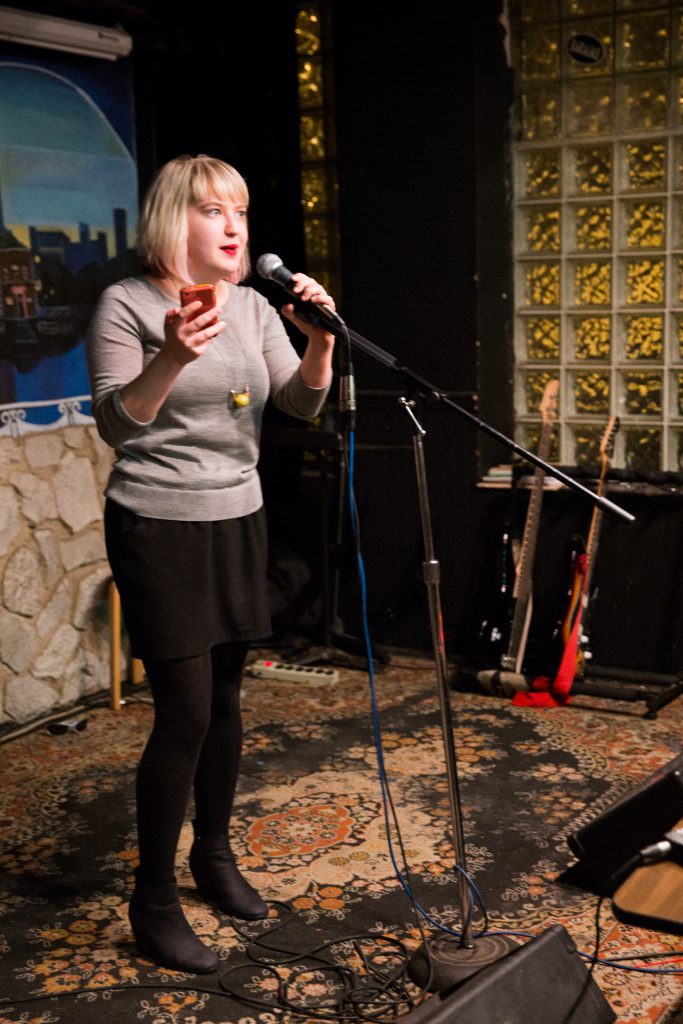
MSL: Do you both read at every show?
JD: I think so, yeah.
RL: I think so. Part of this was, I do well with a deadline. [all laugh] I was like, “Well, if you have to read in front of everybody every month….” But if one of us is out of town or something–
JD: Or there’s just a lot of shit going on.
RL: –we’ll get somebody else to co-host. And then we won’t read.
MSL: Is it also about a shared vulnerability? This is connected to something you said earlier, Rosamund. In my work as a teaching artist, for example, I tell students that I’ll never ask them to do something that I won’t do.
RL: Yeah! I guess I’ve never consciously thought of it that way, but I think that’s true — from a lot of our own experiences of live lit and other things in life. I set the same standards for us that we do for everybody else.
JD: Yeah. And I feel sometimes like maybe I’m not doing a good job of setting that standard because of what I write about. Lately all of my stuff has been related to health and stuff that’s really personal for me, and I would see people listening who seemed like, “Holy shit, I too have to talk about my major health issues.” No, it’s just me. And I don’t want to ever feel like I’m giving everyone this burden of knowing a lot about me. I think that’s where the theme comes in, too. In some ways it kind of focuses or puts limits on what I share.
RL: It grounds it a little bit.

Podcast: “Fangirl” episode of Miss Spoken, hosted by Jasmine Davila and Rosamund Lannin and featuring Megan Kirby, Anne Abel, LeeAnn Yops, Kathleen Rooney, and Keidra Chaney. Image: Miss Spoken logo.
MSL: Do you ever have readers suggest themes to you?
RL: Sometimes. People will throw them out occasionally but, honestly, I like that we come up with the themes. This is not an open call for themes. [Marya laughs] As we just described, we have kind of a strategy in mind.
MSL: And when you spend that day narrowing down themes in the Google Doc, what else are you thinking about? What things are you weighing, or how are values of the show coming across in that process?
RL: Sure. This is dumb, but I guess I do think about seasons. Definitely I think about what month is this–
JD: What’s going on in the world.
RL: –what’s going to be on people’s minds. Like for September, I like it to have some kind of back-to-school element. For October, I love some spooky shit of some kind.
JD: With the exception being last year, when we had a show about politics and voting rights because it was right before the midterm elections.
MSL: I mean, that’s also scary shit. [all laugh]
RL: Yeah. I mean, to be blunt, the world still doesn’t take women or their perspectives very seriously. So any theme we have will be an improvement on that.
MSL: Do you have repeat readers? Or audience members who come every time?
RL: We definitely have audience members who come every time.
JD: Like Megan Kirby’s sister.
RL: Megan Kirby’s sister, who’s now going to go down in the Chicago Book of Records. [Marya laughs] Kara Kirby is a superfan. She has a very loud laugh and god bless that.
JD: Megan also has her own live lit show, but if Megan’s doing a show that happens to coincide with ours, Kara will come to our show instead. [all laugh]
RL: It’s so good. But yeah, we do have people who show up a lot. As for repeat readers, yes, but I try not to repeat too much. Because I have been to other live lit shows where you see the same people perform over and over again. And I never wanted to be that. I like to elevate people who don’t always go to the same five shows or might not be as aware of the live lit “scene.” And, honestly, I think we do a good job of that.
JD: I think so too.
MSL: It’s funny because I was listening to the podcast and there were so many episodes where I’d be like, “Oh, I know that person! How did they get connected to this?” [Jasmine laughs]
RL: That’s our legacy.
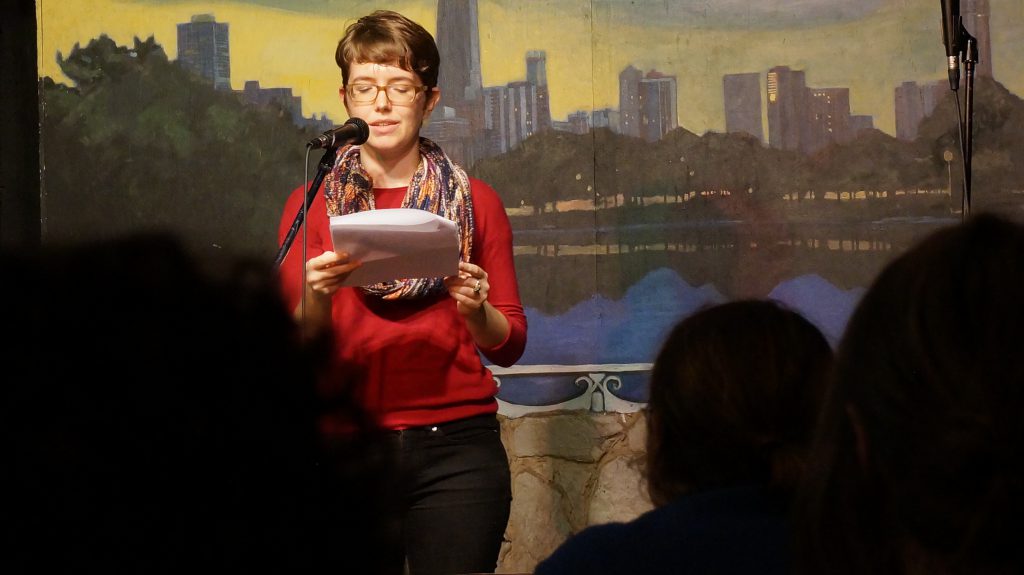
Image: Photo of Nathalie Lagerfeld performing at Miss Spoken at the Gallery Cabaret. The reader stands on-stage, speaking into the microphone and looking down at a set of papers. Lagerfeld wears a red shirt, dark pants, a multi-colored scarf, and glasses. The reader appears in medium-long-shot near the left-center of the frame. Painted on the stage wall behind the reader is a scene showing Chicago’s skyline, as if viewed from behind a stone wall. In the foreground, the backs of a few audience members’ heads are visible. Photo by Sarah Joyce. Courtesy of Miss Spoken.
MSL: What’s important to you in a reader? When people submit in accordance with the themes you put out there, what are some of the things that you’re looking for?
JD: On time.
RL: [laughs] That they’re on time! And please show up! For purely practical reasons, please do not bail. Hmm, what’s important…? I guess someone who has a good stage presence. While we allow reading off a paper, it is a little tough when someone reads just straight off the paper. Someone with some stage presence or who at least tries to have a stage presence. That doesn’t mean “don’t be nervous,” it just means, “have some emotion in your telling.” I mean, you’re telling something, you’re not just reading an English paper in front of people.
MSL: Have you ever reached back out to someone who has submitted to say, “You know what, come to one of our shows and get a sense of what we’re doing…” or “That sounds interesting, but narrow it more….” Or is what they submit the final deal?
RL: We’re a little brutal on the pitching stuff, I feel like.
JD: Yeah.
RL: I guess, I would hope that if you’re interested in submitting to the show, you would listen to at least one episode and get a little familiar. I guess maybe that’s another reader qualification. We do have standards? Sorry, that’s terrible. [Jasmine laughs] We do. Everyone who’s read for us: You met those standards!
JD: It’s true. And we do use a line that we picked up from Karen Shimmin of Essay Fiesta. We say that we look for something with a strong narrative, like a specific story. Not, “I think I’ll just talk about coffee” or whatever.
RL: Because I think there’s a sense with this type of thing that because it’s performance it means that it doesn’t have to be pulled together. But it’s a much more compelling story if you, you know, give it an edit.
JD: Or it’s like, “I’m a funny person, my friends always laugh at my jokes when we go out, so I’m sure that I could spend 5-7 minutes talking about whatever.” No.
RL: Definitely someone who has put some effort into the telling. And, again, you can be super new, you can be super awkward, you can be super nervous. But I think you can definitely tell the difference if someone just kind of fired something off versus put some care and thought into it.

Podcast: “Catcall” episode of Miss Spoken, hosted by Jasmine Davila and Rosamund Lannin and featuring Lily Be, Ola Faleti, and Karen Clanton. Image: Miss Spoken logo.
MSL: Do you have favorite pieces that you’ve performed yourselves, or are there stories by others that you carry with you?
RL: Yes. I really like Alba Machado’s story for “Race” about her grandfather and our president, because she played the guitar during it and it was amazing. It might not have been the guitar — it’s that other one. Cute, quirky girls play it? Which she is.
JD & MSL (unison): Ukulele?
RL: There we go. [all laugh] I loved that there was a little musical number in it. Alba made up a song in response to Trump. She’s a really great writer. That’s one of my favorites that stuck with me.
JD: One that I remember from last summer was Lily Be’s, for “Catcall.” So, Lily is a known storyteller — she’s won story slams, she teaches, she’s incredible. She told a story about how when she was a teenager, she was walking home late at night instead of waiting for the bus at Belmont and Kimball — so she decided to walk from like Avondale to Humboldt Park. And she spoke about basically getting catcalled by this dude in his car, who was following her and wouldn’t leave her alone. And he kept finding her. She ended up ducking into a backyard, pretending it was hers. So it was so frightening, but it was also one of the funniest things I’ve ever heard, because she was talking shit to him the whole time.
RL: But it was terrifying at the same time — a good mix of humor and terrifying. And again, a very familiar situation in some way or another for most women.
I’m trying to think of other themes that I’ve liked. I still love our inaugural theme, “Boobs.” “Fangirl” was really fun.
JD: I liked “Letters.”
RL: “Letters” was good. That one was a little more reading-off-the-page but not in a bad way. That felt appropriate to the theme.
JD: I loved “Pizza.”
RL: The pizza show was really fun.
JD: That was something we just did in collaboration with the US Pizza Museum, which is here in Chicago.
RL: I feel like everyone really brought their A-game for once, including us. [laughs]
JD: And it’s weird because I don’t know that we felt or gave other readers any particular pressure to be better than we usually are. It was just, “We’re going to talk about pizza.” But I think that once we decided it was going to be a battle, and every reader had to pick a regional style of pizza to defend, that’s when I got really excited about it.
RL: Same. I also knew I would not win. [all laugh] But that’s fine!
JD: You picked California-style pizza! What made you do that?! [laughs]
RL: I also got three texts that were like, “Is that real?” [Jasmine laughs] And then there was actually a picture of it in the museum that said “California style” that I was like, snap, “Yes.”
MSL: And that was a co-ed episode?
JD: We didn’t get any shit for it.
RL: I was so nervous though. But you know what? On some level, I’m like, it’s our show. Do I think there should be more female food writers? Absolutely. Oh, yes. We and our readers are female-identified writers — until sometimes when we bend the rules a little bit. So that one was co-ed.
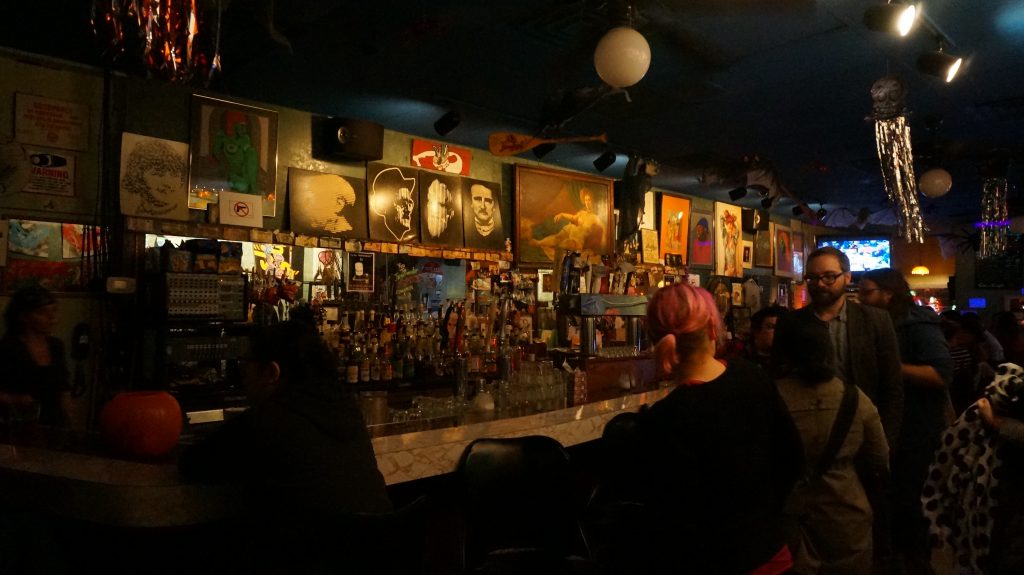
MSL: Do readers get paid? If so, how are you able to do that?
RL: They do! We take an audience donation at every show and we divide it evenly among the readers. They get paid and I’m really proud of that.
JD: They’ve always been paid, right?
RL: I think so. There might have been a few months in the beginning where they weren’t. But from very early on, they’ve been paid. I don’t fault any other show for not paying their readers, but it was something that I always wanted to do.
JD: I will say that Tuesday Funk started doing it in part because we do. They do it the same way, too.
RL: I mean, there’s a difference between not being paid and being paid a small amount, and that’s an important difference. Like, “At least I can pay for my beer that night.”
JD: Or a Lyft home.
RL: I just feel like it’s a lot to ask of someone to come out and provide entertainment for free. And I don’t know, I don’t believe in removing the economic component from creative stuff. Everyone needs money! Everyone’s earning it somehow.
MSL: I think it’s meaningful even if just as a gesture that says, “Creative labor is important, your time is important–”
RL: Yeah. It’s labor. This is work, just like any other job. It’s not like you just sit and then it comes into your head, you know? You actually probably did something to make it happen, and you’re showing up somewhere for a couple hours.

Podcast: “Letters” episode of Miss Spoken, hosted by Jasmine Davila and Rosamund Lannin and featuring LeeAnn Yops, Anna Wolfe, and Lisa Hilleren. Image: The Miss Spoken logo.
MSL: From the beginning, was the idea that Miss Spoken would be a live show and a podcast?
RL: I think the show’s been recorded from the first episode. I actually don’t remember why that was decided, but I do remember that people started saying, “Oh, we love that you record.” Because usually, with a lot of this kind of stuff, it’s ephemeral, and you don’t have anything to reference after. I’ve noticed some readers have linked their performance with us on their website. Recording gives people something like a touchstone. And it also gives people in other states — all five of them that listen to our show — something they can listen to even if they can’t be there. So it’s a double thing — it makes it a little more permanent and gives it a broader reach.
Our A/V squad is one woman, Sarah Joyce. She is half of GlitterGuts photography and she both edits our audio and has occasionally taken photographs for us, which are all fantastic. Also, I don’t want to learn how to edit audio that well.
JD: I do not either.
RL: Actually, this is a lesson: Delegating and farming things out to other people is fine sometimes. I really respect people who do all of it, but, also, I’m fine not doing one-eighth of the show, as there is someone who will take 20 minutes, and she’ll do a way better job than me. [laughs].
MSL: Since you started the show, have you changed anything significantly? Because I think that’s important to think about, not only “what do we want to add or change?” but also “what do we need to let go of?”
RL: Totally. There’s been a lot of small tweaks over the years. And at the beginning– Oh, man. Now I’m going to totally shit-talk. [Marya laughs]
JD: Do it.
RL: We used to have this way before you, Jasmine. We used to have a table read, where you get together before the show and have everyone practice their piece. We gave that up so fast. Because, first of all, that’s a lot to commit to. I know some shows do it, but I do not believe in table reads. There’s a really funny article, “The Pen is Writier than the Sword” [link]–
JD: Oh, god, yeah. That’s great.
RL: –by Claire Zulkey, Wendy McClure, Molly Backes, Kate Harding, and Kelly McNees. It’s a satire of live lit shows. Every word of it is completely accurate. There’s a joke in it that’s essentially like, “We’re going to go to Steve’s house, on the way west side of town, for three hours for a table read. Beverages will not be provided.” And the joke is that you’re making people do a lot for an event they’re not getting paid very much for, if anything. So we ditched the table read. That was one big thing. And there’s been small and medium adjustments.
JD: Like I scripted the patter that we do — for starting, for what we say at intermission, reminding people to donate. Because without it we could riff on bullshit forever — though we still find time to improvise.
RL: Jasmine did a lot to improve the process.
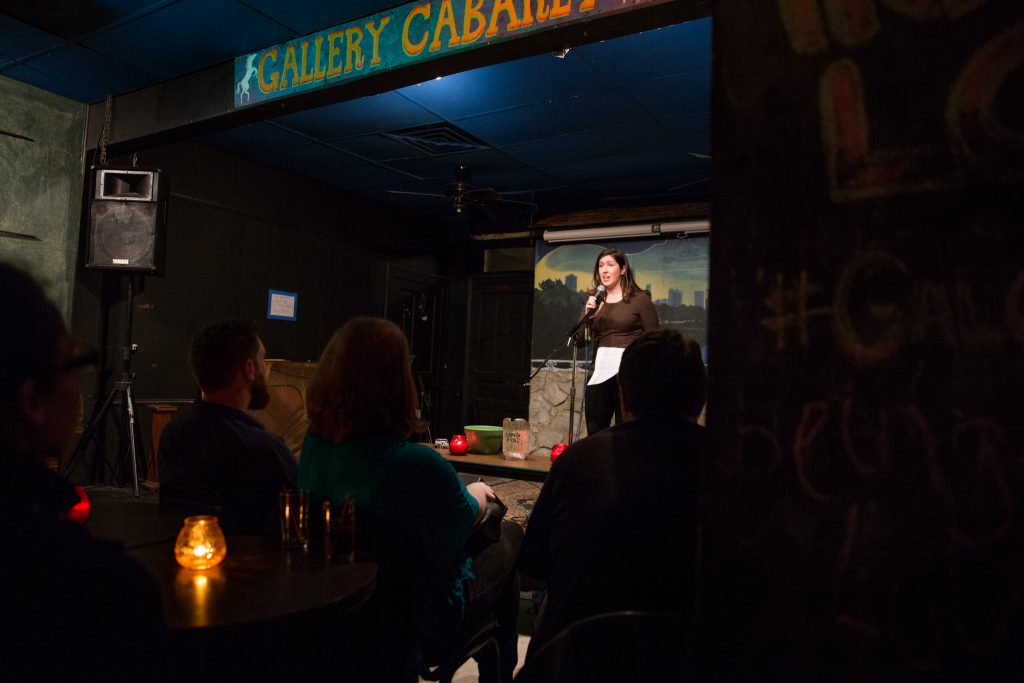
MSL: What kinds of responses have you gotten to the live show and the podcast, from audiences or readers?
RL: Mostly overwhelmingly positive. I don’t know if we live in, like, a tiny, liberal, supportive bubble. There did used to be an older man at the Gallery Cabaret who would come up after every show and ask if he could read and “was this open to men?” and he would leave us notes in the donation box. But he hasn’t been around in a while! I guess I shouldn’t assume responses should be negative commentary. I mean, overwhelming support?
JD: I would say so. It’s been positive.
RL: Very positive reception.
JD: I think it always feels like the response is more to the story than to the show itself.
RL: Which I think is how it should be. I feel like people are usually very engaged. I always want a bigger crowd, but that’s not so much a response as I wish people would bring their friends.
MSL: Are there other ways in which you want the show to grow? Or do you have ideas about things you want to try?
JD: I do, I do, I do!
RL: Jasmine does.
JD: I want to take Miss Spoken on the road. So I have this very lovely friend named Doug McGray, who started out as a journalist and editor, and he basically produces two huge projects. One is The California Sunday Magazine, which is–
RL: Amazing.
JD: –this digital publication you can subscribe to and which gets included bi-monthly in the major Sunday papers in California. The other is Pop-Up Magazine. Basically he assembles writers and musicians and artists to produce a live, multimedia stage magazine that travels to cities all over the country and even Canada. It’s been to Chicago. I’ve always wanted to do something like that for Miss Spoken, on a much smaller scale. We could visit other cities, like Minneapolis, St. Louis, New York, and other places where there is definitely storytelling, if not “live lit.”
RL: A creative community.
JD: Maybe London — a city I’ve always loved — because they are sort of getting into live lit, like it’s an emerging thing for them. And I have no idea where our podcast audience is, but I feel like it wouldn’t be a lot for the two of us to go around the country for a month and do shows with local theaters.
MSL: Totally. And you could even reach out to your past reader pool and be like, “Hey, who’s from Cincinnati? Who knows people in Cincinnati?”
Aside from those you’ve already mentioned, are there any people, groups, organizations, etc., that you feel have especially influenced your own work as writers and performers?
RL: Yeah! Oh, man.
MSL: And I recognize it’s a big question.
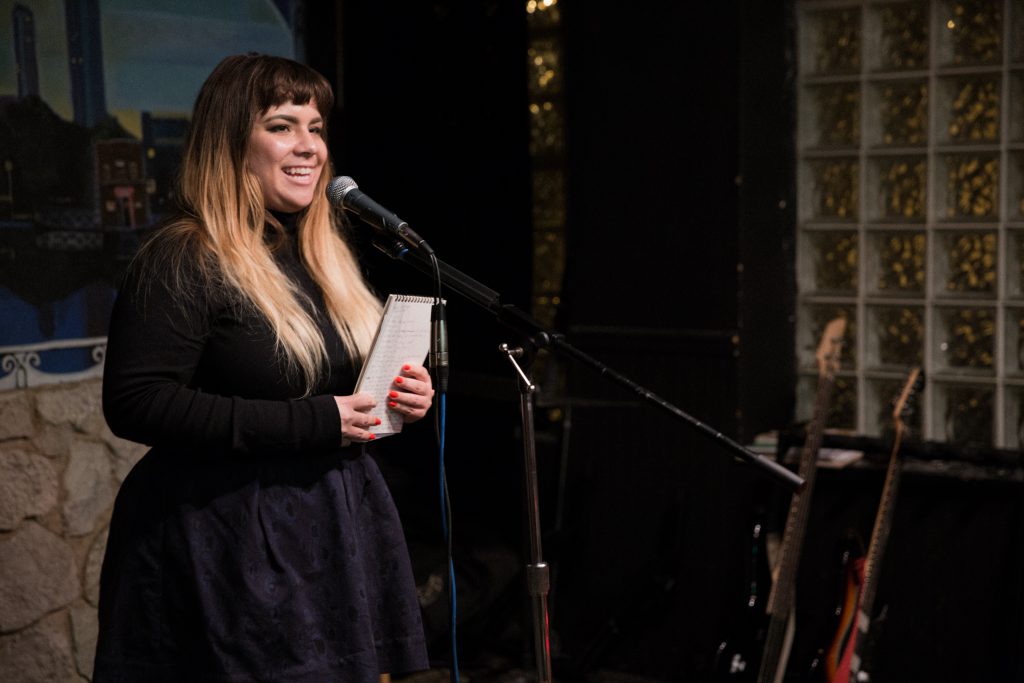
RL: No, for sure. I guess, in terms of live lit shows in the area, I love Kelsie Huff and the kates. I love what she’s always been doing and her style. I try to bring a touch of stand-up to my writing — again, going back to that “it’s performance!” aspect. And I think Kelsie taught me a lot about timing and incorporating your own physical body and personality.
JD: I like Tuesday Funk. Because it’ll be different types of writers reading different types of things — poetry, book excerpts, short fiction, non-fiction. Andrew Huff is one of the co-hosts and always writes topical haiku for each show.
MSL: I’m glad you brought up poetry, because that reminds me of the “Periods” episode of Miss Spoken, when an audience member shared a poem she wrote to the tampon that she accidentally left inside her body for like a month.
JD: Oh my god!
RL: My god…
MSL: That was one of many moments where I thought, nowhere else have I heard this kind of story shared! So, I’m a big fan of “Crazy Ex-Girlfriend”–
JD: Yeah.
RL: Me too.
MSL: –and I remember a few stories from Miss Spoken that were about period sex or different things, where I was like, “Until ‘Crazy Ex-Girlfriend,’ I never saw a television show reference that — and here is Miss Spoken, doing it too! Hoorah!”
RL: Totally! I guess in terms of bigger than, you know, Chicago and the live lit scene, Lindy West is a big inspiration. Roxane Gay is pretty amazing. I’m tossing out the names that everybody tosses out but they’re iconic for a reason.
MSL: Still important to recognize.
JD: Samantha Irby.
RL: I really love “Broad City,” that style of humor — that sort of screwball, period sex humor. I mean, talking about things that are verboten, because they’re verboten for a ridiculous reason. A lot of people get periods, a lot of people have sex, we should be talking about this. It’s not gross or icky. It’s often really funny. I also love Chelsea Peretti. She’s great.

Podcast: “Blue Balls” episode of Miss Spoken, hosted by Jasmine Davila and Rosamund Lannin and featuring Jillian Ebanks, Jess White, and Lindsay Eanet. Image: Miss Spoken logo.
MSL: Jasmine, I’ve been meaning to tell you that I loved the piece you read at the “Blue Balls” show.
RL: It was really good.
JD: Thank you!
MSL: I loved it in general, and there were so many parts where I thought about how I know people who’ve gone through chemo, and it never occurred to me that someone in treatment might be too tired to masturbate. Literally never thought about that, never heard about that. I mean, going back to “taboo” stuff–
RL: Absolutely!
JD: It was one of those things that came up for me because I tried a couple of times and I was like, “Oh. No…” and just sort of fell asleep in the attempt. But now that I’m sort of post-treatment and involved in the survivorship oncology part of this whole journey, I get questions about it. Like I have a nurse practitioner who I met with a month ago who asked me about my libido, and am I having sex, and I was just like, “What?” These are not questions that I necessarily expected from her. I felt like I had to say something about it, and I thought, [laughing] “Well, this is going on right now!”
RL: But it’s also, what gets treated as important to talk about?
JD: Exactly.
RL: We think this stuff is super important to talk about — I’m going to keep going back to this thesis statement, hammering it home.
Did you ever see “Lady Bird,” the movie? There’s this part where she’s like, “It’s not all war.” Like, you’re allowed to have levels. There’s different levels of being a person, and they’re important, and who gets to decide which are important or not is usually men. And we think that all of that stuff is really important.
JD: I still have to see that movie.
RL: I loved it, but if you don’t like it, it’s okay. It is divisive. I promise I will not be like, “You didn’t love it?!” My goal for 2019 is to not be the Comic Book Guy from The Simpsons, or do that nerd-rage thing where you’re like, “What?!” [gasps] People are allowed to have different opinions about different media.
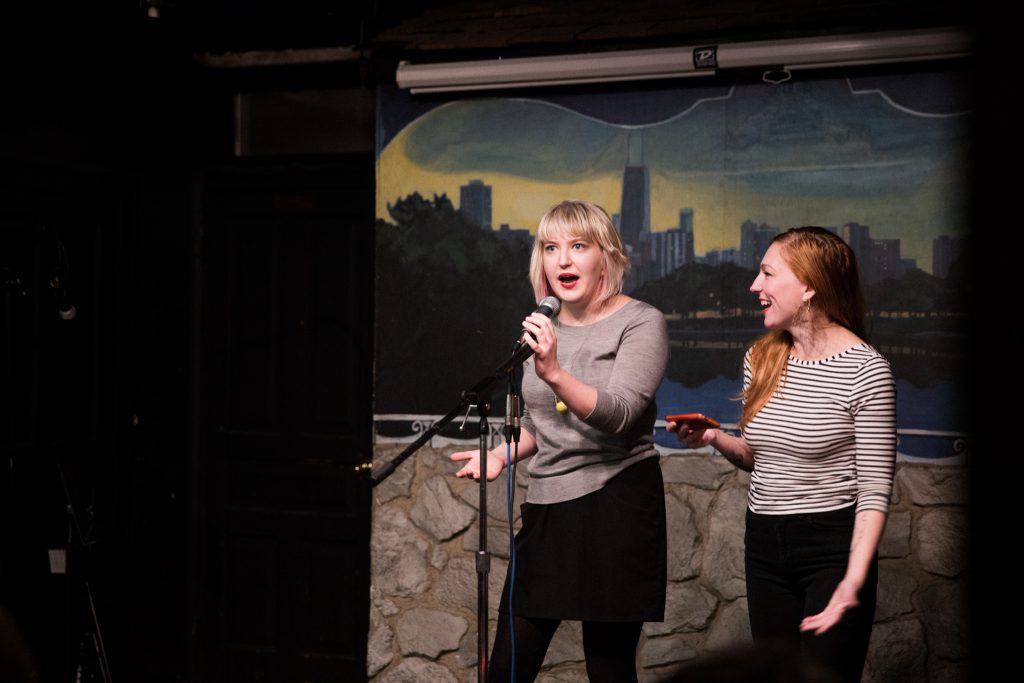
MSL: Do you both also write for other outlets?
JD: She’s always bugging me to pitch stuff.
RL: I’m like, “Hey Jasmine, how about this?” I’m the literary agent no one ever wanted. That’s always my unofficial job. I just think all your stuff is great, that’s all.
Yeah, I do write for other outlets. I have a piece coming out with Lifehacker, about how to learn to drive as an adult — because I learned to drive when I was 27.
JD: Oh, you didn’t tell me about that piece! I thought you were talking about the fiction one.
RL: I also have my first fiction piece coming out in June, in Lady Churchill’s Rosebud Wristlet. It’s speculative fiction, so sci-fi, fantasy, horror type stuff. It’s interesting, because I feel like I’ve been moving a little bit away from the personal essay and trying to move into other things? Not because I don’t super love the personal essay, but you kind of tap out a bit after a while.
JD: Or you need a break from it. If you’ve spent your last five years telling personal stories…
RL: If you’re writing only personal stories, you’re like, “I’m done. I’m uninteresting even to myself.” P.S. That’s usually how I went into it, too. But yeah, it’s hard. Somebody wrote this really great Twitter thread or essay about how you should have something else you can write about, because mining your personal life for a regular job is exhausting. And, honestly, my life is pretty boring most of the time these days, in an awesome way.
I will give advice: If you’re going to do this for a living, don’t just do personal essays. Because even if you write some amazing ones, you don’t want to be a factory churning those out — although a lot of websites will pay you to do that. That’s terrible.
JD: The other thing I’ve been writing is fan fiction, and I started doing that maybe…mid- or early 2015. So for like four years now.
RL: Wow.
JD: Which feels like forever, but in comparison to other people that I read or that I know online, that’s nothing. But I have been thinking about working with my friend Jessi on updating a couple of my fan fiction pieces to be actual stories and, because she’s a filmmaker, converting a story into a script that she then makes into a short film. We’ll see.
MSL: To close out, how has being involved with Miss Spoken impacted you?
RL: It’s made me a better writer.
JD: I hope it’s made me a better writer. [laughs]
RL: Just by the sheer virtue of, if you keep doing something–
JD: It’s practice.
RL: It’s practice! And also I usually see or hear onstage what works and doesn’t work. Where I’m like, “Oh, I’ll go back and tweak that!” You can really get a sense of — and I’m totally copying Samantha Irby here, because she’s better than me, so I’m riding those coat tails–
JD: Oh, I’ve been very blunt about the fact that my goal, all this time, is basically to be the Asian Samantha Irby. That’s always been what I wanted. [laughs]
RL: I don’t consider Samantha to be my “goal,” but she had this quote where she talked about how you really get a sense on-stage of what works and what doesn’t. And you totally do. Because if something isn’t really singing, you can tell. Especially if you read it aloud, which you should do anyway even if you’re not performing it.
And being involved with Miss Spoken has taught me how to run a show! [laughs] I think it’s probably made me more open, because I’ve heard a lot of different types of stories. I’m an anal-retentive person, and I feel like it’s tweaked the edges of that in a good way. You have to kind of relax a little bit or be flexible sometimes.
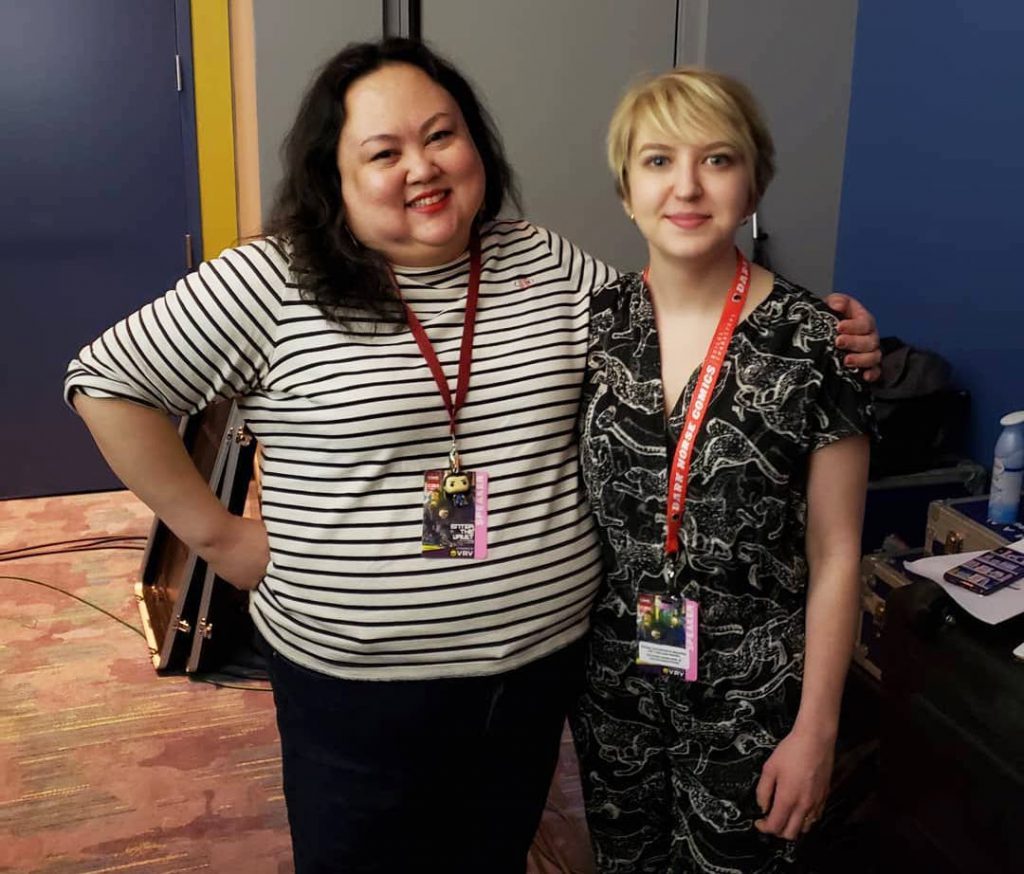
Image: Jasmine Davila (left) and Rosamund Lannin (right) stand together backstage at C2E2 for Cards Against Humanity Theater, smiling for the camera. Davila wears a white and black striped shirt and black pants, and Lannin wears a patterned black and white jumper. Both wear red lanyards around their necks and badges that read “Speaker.” Davila has one arm around Lannin’s shoulders. Around them backstage are A/V equipment cases and miscellaneous objects. Courtesy of Miss Spoken.
JD: I feel like I’m sort of always eyeing my friends. If they haven’t read for us, I’m like, “I know you have a story….”
RL: Oh, absolutely!
JD: And when they say, “No” or they’re like, “I could never do that…,” I grit my teeth and I’m like, “Yes, you can!”
RL: “Oh, yes you can!” [all laugh] I love how we’re benevolent-bullying people into storytelling.
JD: I try to do it in a way where it doesn’t sound like I’m trying to exploit you, but it’s just like, “You’re such a great person, this is such a great story, I want people to hear it because I need them to know how good the story is and how great you are.”
RL: And I think that women and marginalized groups are often taught that our stories aren’t interesting. I think they’re really interesting! If not more interesting, a lot of the time. A lot of the stories that we’ve heard for the past 500 years are not super interesting. You know? So I’m ready for new stories — or, they’re not really that new. I’m ready for stories to be floated up.
JD: I love it when I’m surprised by what people come and tell us. Even when you know the pitch, the story ends up being so much more in the telling. And that what you think of as “a woman’s story” or “what a woman would be interested in” — it’s everything. It’s not just a very narrow set of topics. And, again, we have themes but people are free to interpret them as widely or not widely as they care to. I love the surprise of how they do that more than anything else.
RL: Absolutely. It’s beautiful to watch it unfold.
MSL: Is there anything we haven’t talked about that you think is important to mention?
RL: As one final takeaway and something I’m trying to do more this year: Don’t just support big names. Pay attention to your local stuff. Because that’s where everybody starts. And question if you’re seeing no female faces or faces of people of color. Have an expectation in what you consume, I guess. And don’t just focus on the people who get wildly famous. Pay attention to your local stuff.
Featured image: Rosamund Lannin (left) and Jasmine Davila (right) stand in front of a giant wall of hardcover and softcover books that extends beyond the frame of the photo. The books are stacked floor to ceiling so that each book’s top or bottom edge is visible but its spine is not. Together, the pages create a mosaic of white, tan, and light brown rectangles behind the subjects. Davila wears a black jumper over a white and black striped shirt, and Lannin wears a black shirt. Both hold loose papers and lean, smiling or speaking, toward the microphone that Davila holds. Photo by GlitterGuts, cropped to fit. Courtesy of Miss Spoken.

 Marya Spont-Lemus (she/her/hers/Ms.) is a fiction writer, interdisciplinary artist, and educator focused on teen creative, leadership, and professional development. She lives and works on the Southwest Side of Chicago. Find her on Twitter and Tumblr.
Marya Spont-Lemus (she/her/hers/Ms.) is a fiction writer, interdisciplinary artist, and educator focused on teen creative, leadership, and professional development. She lives and works on the Southwest Side of Chicago. Find her on Twitter and Tumblr.
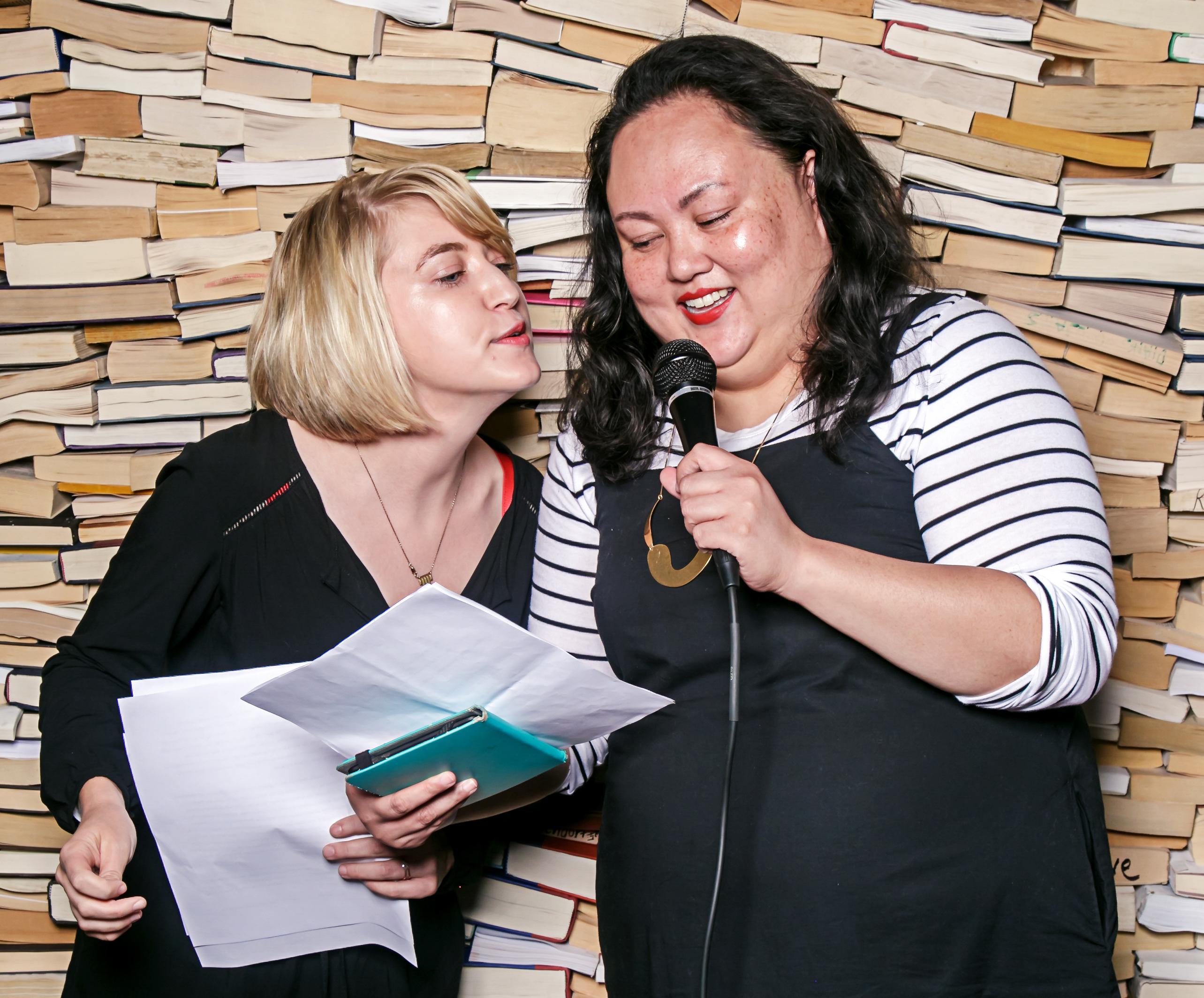
![[placeholder image]](https://sixtyinchesfromcenter.org/wp-content/uploads/2020/12/Quenna-Lené-Barrett_Headshot-300x99.png)
